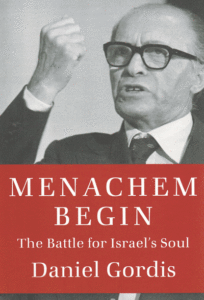Menachem Begin: The Battle for Israel’s Soul, by Daniel Gordis, Schocken, 311 pages, $27.95
Reviewed by NEAL GENDLER
Daniel Gordis calls Menachem Begin “the most Jewish of Israel’s prime ministers” and a leader now much missed.
“I wrote this book to find out why,” says Gordis, a rabbi, writer and senior vice president at Shalem College in Jerusalem, could “someone so polarizing, so controversial… appear today as the soul not only of Israel’s best self but as a living fusion of Jewish consciousness and aspiration.”
The answer is “bound up with his unabashed, utter devotion to the Jewish people.”

In Menachem Begin: The Battle for Israel’s Soul, Gordis examines that devotion’s linkage with belief in Jewish dignity — no more subservience — in democracy and in adherence to law, advocated by a slight man who could impress with speech, charm with warmth and madden with stubborn-seeming consistency.
Some new esteem may come from later leaders’ behaviors, including the bribery conviction of former Prime Minister Ehud Olmert. Begin lived honestly and modestly, giving his Nobel Prize money to a foundation for disadvantaged students.
“There was something about him that led the powerless to believe he cared for them, not as a matter of policy or political wisdom, but as a matter of instinct,” Gordis says.
Begin allied with Mizrachi (Middle Eastern) Jews, who felt slighted by the mostly Ashkenazi establishment. After his May 1977 victory, “many Israelis, especially Mizrachi voters, took to the streets” in jubilation.
“Begin did not join the dancing,” Gordis says. “Instead, he donned a kipa and recited the Shehechiyanu. Israelis had never witnessed such an act by a high-ranking politician.”
Gordis says David Ben-Gurion’s “hatred for Begin knew no bounds,” that Ben-Gurion maligned Begin and repeatedly lied, denying Hagana had approved Irgun attacks that notoriously went wrong, such as the Deir Yassin massacre and the bombing of British headquarters in the King David Hotel.
Ben-Gurion refused to speak Begin’s name in the Knesset, calling him “the man sitting next to [Knesset Member] Bader.”
Begin was born in Poland, commanded Vladimir Jabotinsky’s 70,000-member Betar organization there, and was arrested by the USSR in Lithuania in 1940. He was freed from slave labor to join the Polish Free Army, reaching Palestine in spring 1942. He was discharged there in January 1944, soon going into hiding while commanding the Irgun.
Gordis says Irgun sought to minimize civilian casualties, and that Begin was troubled the rest of his life by the Irgun’s retaliatory hanging of two British sergeants, which ended British hangings of Jews.
Leading a rightist opposition for 29 years, Begin roiled the country railing against German reparations as blood money. In power, he encouraged building in Judea and Samaria — begun under the Labor Party — but gave up the Sinai for peace with Egypt. He ordered the destruction of Iraq’s nuclear reactor and the rescue of Ethiopian Jews, and welcomed 66 Vietnamese refugees who’d been adrift at sea, calling it the Jewish thing to do.
Gordis’ easy-reading biography was done with three research assistants in order to appear in Begin’s “centennial year.” Gordis lists earlier Begin biographies — some more detailed — by others.
Begin’s health was precarious: diabetes, a heart attack in April 1977 and an October 1977 heart-membrane inflammation that put him in the hospital and on “an array of medications for the rest of his life.” Begin collapsed in May 1978, suffered a stroke in July 1979, broke a hip in 1981 and 1990, and suffered another heart attack March 3, 1992, dying six days later at age 79.
Weakening, he persevered until after the ill-fated 1982 invasion of Lebanon and the death of his wife, Aliza. Exhausted though only 70, he resigned in 1983, rebuffing pleas to reconsider with a simple: “I cannot go on.”
Begin never fully overcame his terrorist label, but Gordis says “getting the British to leave was more Begin’s accomplishment than Ben-Gurion’s.” Both wanted a Jewish state, but wanting wasn’t enough; “one had to actually do something in order to achieve it.”
Both men were necessary, and “without either one, Israel might well not have come into being.”
***
Neal Gendler is a Minneapolis writer and editor.
(American Jewish World, 4.25.14)



















